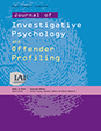Investigative Interviewing of Child Sex Offender Suspects: Strategies to Assist the Application of a Narrative Framework
Abstract
Obtaining a narrative account from a suspect during an investigative interview is recommended in the literature as best practice. However, research shows that interviewers have difficulty adhering to this recommendation. This paper aims to provide police officers who interview sex offender suspects with suggestions that may assist them in the application of a narrative framework. Our approach involved individual in-depth interviews with experts (N = 16: police trainers, detectives, expert witnesses, defence barristers, and prosecutors) who were leaders in their relative fields, particularly in relation to interviews with sex offender suspects. Specifically, the experts were asked to talk about the process of interviewing and what constitutes a good interview with a sex offender suspect. Several strategies that may assist officers in adhering to a narrative framework were extracted through qualitative analysis of the data. These strategies are described under the following headings: letting the suspects answer the allegations put to them, transferring the locus of control to the suspect, adopting strategies to overcome emotional barriers to reporting, and focusing on the relationship between the suspect and the victim. Directions for future research and training intervention are also discussed. Copyright © 2011 John Wiley & Sons, Ltd.




